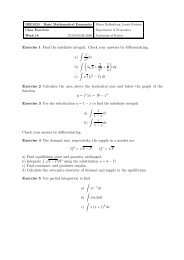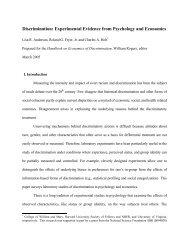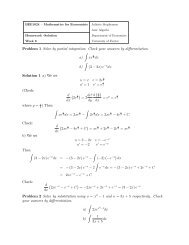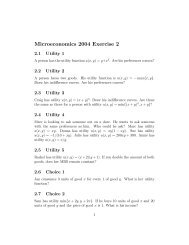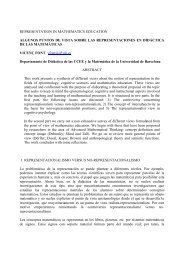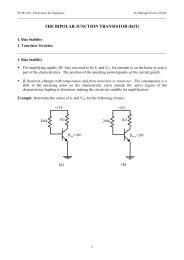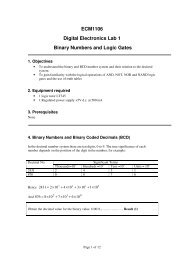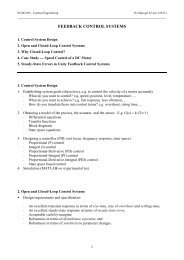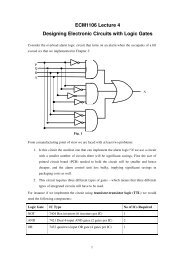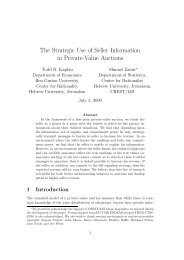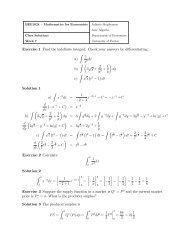we also use simulations to compute each participant’s expected payoff when she is matched withevery member of the opposite role in her session. For example, in the actual experiment, a PlayerA is r<strong>and</strong>omly matched with one Player B in her session <strong>and</strong> the payoffs for both players aredetermined by their stated strategies. In the simulation, however, a Player A is hypotheticallymatched with every Player B in her session. Her expected payoff is the average payoff she getsfrom each match. We compute the expected earnings for all players <strong>and</strong> present the results acrossall games in Table 7. 25[Table 7 about here.]Table 7 reports the actual average earnings <strong>and</strong> the expected earnings for Players A <strong>and</strong> B<strong>and</strong> for all players, for three matching conditions: ingroup (column 2), outgroup (column 3), <strong>and</strong>control sessions (column 4). Columns 5 to 7 present the alternative hypotheses, as well as thep-values for paired-sample t-tests for Players A, B <strong>and</strong> over all players.Result 6 (Earnings). Participants’ actual average earnings <strong>and</strong> expected earnings are significantlyhigher when they are matched with an ingroup member than with an outgroup member.Compared to the control sessions, ingroup matching yields marginally higher earnings whereasoutgroup matching yields significantly lower earnings. Comparisons of expected earnings are allassociated with higher confidence levels than those of actual average earnings.Support. Column 5 in Table 7 presents the p-values for paired-sample t-tests, p < 0.01 for PlayerA, B <strong>and</strong> over all players, comparing expected earnings from matching with an ingroup vs. anoutgroup member. A comparison between columns 2 <strong>and</strong> 4 shows that ingroup matching is associatedwith slightly higher expected earnings than matching in control sessions. It is statisticallysignificant at the 10% level only for Player B. For Player A <strong>and</strong> for over all participants, we fail toreject the null hypothesis that expected earnings are equal. Column 7 presents the p-values for theequality of mean tests, p < 0.05 for Player B <strong>and</strong> for over all participants, comparing expectedearnings from outgroup matching vs. control sessions. We cannot reject that the expected earningsare equal for Player A. Cross-condition comparisons of actual average earnings show the samepattern, but with lower significance levels. The reason is that, in the simulation, each participantis hypothetically matched twice, once with ingroup members <strong>and</strong> once with outgroup members,whereas she is matched only once with either an ingroup member or an outgroup one under theactual treatment conditions. 26As shown above, the induced group identity introduces a gap in earnings (actual average earnings<strong>and</strong> expected earnings alike) between the ingroup <strong>and</strong> outgroup matches. This gap arises morefrom the loss in outgroup matching than from the gain in ingroup matching, in comparison to thecontrol sessions. In other words, the economic outcome resulting from ingroup matching is madeonly marginally better than the outcome in the control group. However, outgroup matching doesmake agents significantly worse off compared to the scenario where there is no group.In this section, we have examined the effects of group identity on three aspects of social preference:distribution preferences, reciprocity preferences <strong>and</strong> social welfare maximization. With25 Game-by-game comparisons are not presented due to space limitations, but are available from the authors uponrequest.26 Appropriate recombination of individual strategies in simulations can improve the efficiency of the estimation.See Mullin <strong>and</strong> Reiley (2006) for the use of related techniques.18
induced identity, when matched with an ingroup member, participants show more charity whenthey have a higher payoff than their match, <strong>and</strong> less envy when they have a lower payoff. Thelikelihood to reciprocate others’ good intentions or punish others’ bad behavior is sensitive to thecost of reciprocating. Other things equal, participants are more likely to reciprocate positively toan ingroup than to an outgroup match. They are more forgiving towards bad behaviors from ingroupmatches compared to outgroup matches. Furthermore, participants are significantly morelikely to choose SWM actions when matched with an ingroup member. As a result, expectedearnings are significantly higher when participants are matched with an ingroup as opposed to anoutgroup member. While ingroup matching yields expected earnings comparable to those in thecontrol sessions, outgroup matching yields significantly lower expected earnings than does controlsessions.6 Conclusion<strong>Social</strong> identity theory has been applied to a broad array of issues across the social sciences, includingprejudice, stereotyping, social competition, negotiation, language use, motivation <strong>and</strong> commitment,collective action, <strong>and</strong> industrial protest (Haslam 2004). Although it was only recentlyintroduced into economics (Akerlof <strong>and</strong> Kranton 2000), it has the potential to shed light on manyinteresting economic issues <strong>and</strong> provide a novel <strong>and</strong> refreshing alternative to established theories.Empirical work on social identity theory in psychology focuses largely on other-other allocationgames, where participants’ benefits are not affected by their allocation decisions. To formalizeidentity theory mathematically <strong>and</strong> use it to analyze economic problems, it is important to systematicallymeasure the effects of identity in the economic domain. This study does so by investigatingthe effects of identity on social preferences through two-person sequential games in the laboratory.In our experiments, we first induce group identity by using the classic Klee-K<strong>and</strong>isky paintingpreferences, <strong>and</strong> then conduct both other-other allocation games <strong>and</strong> self-other sequential allocationgames. We use the latter to measure the effects of identity on various aspects of socialpreference, including distribution, reciprocity <strong>and</strong> SWM actions.One might hypothesize that people will become more inequality averse when matched withan ingroup member, i.e., they will show more charity <strong>and</strong> more envy. Interestingly, however, wefind an asymmetric effect. Indeed, we find that when participants are matched with an ingroupmember (as opposed to an outgroup member), they show more charity when they have a higherpayoff; however, they show less envy when they have a lower payoff. Both results are consistentwith participants putting more weight on the ingroup match’s payoff in their own utility function.We also present the first empirical evidence for the effects of identity on participant reciprocitypreferences. Rather than taking an ingroup match’s good intentions for granted, participants aresignificantly more likely to reward an ingroup match for good behaviors, compared to an outgroupmatch. Furthermore, they are less likely to punish an ingroup match for misbehaviors. When wesystematically vary the cost of reciprocity, we find that an increase in cost significantly decreasesthe likelihood of either rewards or punishments.Finally, we find that participants are significantly more likely to choose SWM actions whenmatched with an ingroup member. As a result, ingroup matching generates significantly higherexpected earnings compared to outgroup matching.This paper makes two contributions to the economics literature. The first contribution is aframework for the empirical foundation for incorporating identity into economic models. One area19
- Page 1 and 2: Group Identity and Social Preferenc
- Page 3 and 4: ehavior. Deviations from the prescr
- Page 5 and 6: identity strength on cooperative be
- Page 7 and 8: In our study, the stage of other-ot
- Page 9 and 10: while ρ(1 + a) measures the charit
- Page 11 and 12: Support. In Table 2, column 5 prese
- Page 13 and 14: when A is an outgroup match. When A
- Page 15 and 16: compared to outgroup matching, incr
- Page 17: By Result 5, we reject Hypothesis 6
- Page 21 and 22: APPENDIX A. Sequential Games with S
- Page 23 and 24: Based on your choices, you prefer t
- Page 25 and 26: [New Screen]Please record your deci
- Page 27 and 28: [New Screen, Game 1, Player A]In th
- Page 29 and 30: [New Screen, Game 3, Player B]In th
- Page 31 and 32: Appendix C. Post-Experiment Survey(
- Page 33 and 34: Session # Treatment or Control Game
- Page 35 and 36: Dependent Variables Prob(B rewards
- Page 37 and 38: Dependent Variable:Prob(B Choosing
- Page 39 and 40: Tokens3503002502001501005000 1 2 3
- Page 41 and 42: ReferencesAkerlof, George and Rache



